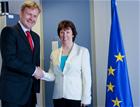New European Representative to Bosnia Raises Big Hopes
Evelina Topalova, September 12, 2011
 New "super" European Representative Peter Sørensen is already in Sarajevo and presented his credentials to Bosnia's Presidency on Friday (September 9). The Danish career diplomat, who will act as head of the EU delegation and Special Representative of the EU in Bosnia (EUSR), will have the uneasy task to help the country in its EU bid against the background of a political deadlock that has been dragging for 11 months now.
New "super" European Representative Peter Sørensen is already in Sarajevo and presented his credentials to Bosnia's Presidency on Friday (September 9). The Danish career diplomat, who will act as head of the EU delegation and Special Representative of the EU in Bosnia (EUSR), will have the uneasy task to help the country in its EU bid against the background of a political deadlock that has been dragging for 11 months now.
At his first press conference after taking over the post he said that the EU's main goal in Bosnia is to strengthen cooperation with all partners and to help the authorities in meeting the criteria from the Stabilisation and Association Agreement (SAA).
Sørensen pointed out the remaining tasks - passing a law on state aid and changing the constitution in line with the ruling of the European Court on Human Rights. Another key moment is to conduct a nation-wide population census with the EU being ready to help as well.
Peter Sørensen called on political leaders to meet their obligations and said that his role was not to intermediate in the negotiations on government formation at central level.
Local media noted one curious detail about the briefing. When entering the hall for the press conference he shook hands and introduced himself in person to each of the present journalists. Sørensen obviously managed to win the sympathies of the media but local politicians' feelings about him remain ambiguous. While some have hailed the appointment because of the proven professionalism of the diplomat, others have been rather reserved.
Even before his arrival some voiced worries that with this appointment Bosnia gets two "supervisors" - because Valentin Inzko remains in the country. Inzko has been in the same time a High Representative of the international community and an EUSR but his duties from now on will be limited to observe how the Dayton Peace Agreement, that ended the 1992-1995 war, is being implemented.
Sørensen takes over as an EUSR less than a month before the European Commission is to publish its progress report on the country, which is expected to be negative. Almost a year after the October general elections, the political leaders of the three main ethnicities - Serbs, Croats and Muslims - have been unable to agree on government formation at central level and this is hampering the reform process. The lack of agreement has led to postponement of financial aid from the IMF, the EU and the World Bank.
Before applying for EU membership Bosnia has to meet the above mentioned conditions.
The first refers to changes to the constitution in order to scrap clauses that discriminate against minorities. In 2009 the European Court on Human Rights ruled that Bosnia's constitution discriminated against some ethnicities who were not allowed to run for the presidency and the upper house of Parliament. The EU is still waiting for results on that matter.
Another key point is to pass a law on state aid. A move in the right direction has been made after the bill was forwarded to Parliament for discussion. Now it is up to the MPs to approve tightening of control on allocation of state aid.
The third condition is to pass a law on a nation-wide census which is being delayed for several months due to controversial moments in the questionnaire referring to ethnic belonging as well as implementation of the results of the process. Republika Srpska has renounced from holding its own population census by year's end as it had threatened to do unless an agreement is reached on central level.
The needed reforms cannot be implemented because local leaders are not willing to make concessions. This refers also to the formation of Bosnia's Council of Ministers which has been blocked for 11 months already. Croats insist on getting the PM post, Serbs - on four ministerial seats, including the foreign ministry portfolio, while the ruling party in the Muslim-Croat Federation SDP says it is entitled to get either the PM or the foreign ministry given its results at the elections.
Bosnia signed the Stabilisation and Association Agreement three years ago but has made virtually no progress since then and started to lag behind its Balkan peers.
Bosnia expects the new EUSR to bring new momentum in the country's EU integration process but this is not going to happen if local politicians do not turn their backs to partisan interests and start working in the name of progress of the common state.
 Bakir Izetbegovic, Andrej Plenkovic | © Council of the EU
Bakir Izetbegovic, Andrej Plenkovic | © Council of the EU Aleksandar Vucic, Recep Tayyip Erdogan | © Serbian Presidency
Aleksandar Vucic, Recep Tayyip Erdogan | © Serbian Presidency Jean-Claude Juncker, Zoran Zaev | © European Commission
Jean-Claude Juncker, Zoran Zaev | © European Commission